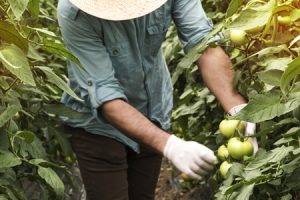[breadcrumb]
 How Can a Vegetable Farmer Get Mesothelioma by Occupational Exposure to Asbestos?
How Can a Vegetable Farmer Get Mesothelioma by Occupational Exposure to Asbestos?
Vegetable farmers concentrate on growing vegetables for human consumption. They may operate small family farms, work on a portion of a larger farm or operate a large agricultural enterprise. Many current day technologies allow for a more automated form of vegetable growing. Vegetable farmers may grow a variety of vegetables, including peas, beans, lentils, tomatoes, eggplants, bell peppers, potatoes, lettuce, carrots, melon, cucumbers, pumpkin, corn, onions, garlic and chives, among many others. These farmers may sell their harvest directly to consumers at farmer’s market or to wholesalers, retailers or canners.
Since asbestos naturally occurs in soil, vegetable farmers may be exposed to it without even knowing it. When agricultural activities are completed, these fibers may become more pronounced in the air and breathed in by farmers and others nearby. Asbestos was also added to a variety of agricultural products, including potting mixes, animal feed and fertilizer. Vegetable farmers may have used these products on a routine basis, which could have made it more likely that they could have contracted mesothelioma or other serious illnesses. Additionally, asbestos is still contained in some potting mixes, so vegetable farmers may continue to be at risk of being exposed to asbestos.
This mineral is resistant to heat and electricity, offers superior soundproofing capabilities and is affordable. These characteristics made it ideal for many applications, including commercial and consumer products and construction materials. Farm machinery that may contain this material include brakes, brake pads, brake linings, gaskets, seals, clutches, and engine parts. Vegetable farmers who use heavy machinery like fertilizer spreaders or tractors may be exposed to asbestos in these parts.
Additionally, asbestos was used to construct many buildings, including silos and farmhouses. When buildings would crack and deteriorate, asbestos-based products could become loose and workers nearby could breathe them into their lungs and other internal organs. Once asbestos fibers enter the human body, it clings to the lining of the person’s lungs and becomes embedded. These fibers cannot be removed and the immune system does not break them down. Over time, the lungs are inflamed and begin to scar.
Typical job duties of vegetable farmers and other agricultural workers include:
- Repair farm equipment
- Spray fertilizer or pesticide on or near crops
- Feed animals and clean their pens and cages
- Harvest and inspect crops
- Irrigate farm soil
- Maintain ditches, pipes and pumps
- Operate farm machinery to plow and sow seeds
- Herd livestock to pastures
Locations in the United States for the Highest Employment Rates for Vegetable Farmers
According to the U.S. Bureau of Labor Statistics, there are currently 975,400 people employed in the category of “farmers, ranchers and other agricultural managers. States with the highest employment rates for farmers, ranchers and other agricultural managers include:
- California
- Texas
- Illinois
- Idaho
- Washington
Similar Occupations as Vegetable Farmers
Similar occupations as vegetable farmers include:
- Agricultural and food scientists
- Agricultural and food science technicians
- Agricultural engineers
- Agricultural workers
- Animal care and service workers
- Construction equipment workers
- Forest and conservation workers
- Grounds maintenance workers
- Veterinary assistants and laboratory animal caretakers
Lawsuits and Settlements Involving Vegetable Farmers and Mesothelioma
Farmers are at relatively low risk of developing mesothelioma and other asbestos-related diseases. However, there have been some notable cases involving farmers, such as one case in which a farmer was awarded $38 million after the jury found asbestos products manufacturers should have been aware of the risks of their products and failed to warn him about them. Additionally, Caterpillar and other heavy machinery companies have been sued when consumers and workers have alleged that these products’ asbestos caused them to develop mesothelioma and other serious illnesses.
Studies Related to Vegetable Farmers
A number of studies have focused on the presence of asbestos in soil and how it may impact the health of nearby workers. A 2005 study showed that the proximity of a residence to naturally occurring asbestos was a risk factor in developing mesothelioma. Several cities throughout the country have observed higher incidents of mesothelioma in areas located near naturally occurring asbestos, including southern California, northwestern Arizona and southern Nevada. Similar results have been explained in other countries, including Mexico and Italy.
Types of Asbestos Products Used by Vegetable Farmers
Vegetable farmers may have worked with asbestos-containing agricultural products, such as:
- Root cuttings
- Seed germination
- Seed encapsulation
- Agricultural filler
- Pesticides
- Animal feed
- Potting mix
Building materials that vegetable farmers may have been exposed to that contained asbestos include:
- Asbestos cement
- Roofing
- Siding
- Piping
- Insulation
- Floor tiles
- Paint
They also may have been exposed to automotive parts that contained, asbestos, such as brakes, clutches, seals, gaskets or valves.
Manufacturers of Asbestos Products Used by Vegetable Farmers
Some manufacturers of products used by vegetable farmers include the following:
- Caterpillar
- Crane Co.
- Durco
- John Crane
- John Deere Co.
